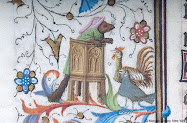 Mais oui, it is Bastille Day and as usual, I’m raising glass of champagne in honour of liberté, égalité and fraternité and looking forward to the traditional French win in today’s Tour de France stage.
Mais oui, it is Bastille Day and as usual, I’m raising glass of champagne in honour of liberté, égalité and fraternité and looking forward to the traditional French win in today’s Tour de France stage.I’ve always been quite stirred by this celebration of reason and enlightenment, but I was just a wee bit disillusioned to find out how undemocratic France’s shift towards democracy really was. Sure, you could have your liberty, your equality and your brotherhood – just as long as you were, well, a ‘brother’. A property-owning male, in other words.
The early days of the French Revolution had carried heady promise for women intent on carving out an active role for themselves in the political governance of the emerging Republic. The sans-culotte women of Paris are famed for their role in forcing Louis XVI and Marie Antoinette to leave Versailles for house arrest in Paris, while smart, fiery and passionate women took leading roles in political organisations like the Jacobin Club and even formed their own short-lived Society of Revolutionary Republican Women. Théroigne de Méricourt, swaggering through Paris dressed in her riding habit, took up arms to fight for the radical changes she wanted to see in society. And Olympe de Gouge’s Declaration of the Rights of Women decried the absence of women from the visionary Declaration of the Rights of Man and the Citizen, and argued for full suffrage as well as for women to be allowed to be elected to the parlements and to act as magistrates. Olympe paid the ultimate price for her temerity, being guillotined during the Terror.
Many of the early gains these women made in the Revolution were too fragile to survive Napoléon’s ultra-conservative social reforms. But their enduring inspiration fired up generations of feminists who came after them, and who fought and continue to fight for women's rights to full citizenship and full humanity. So today, I’ll raise my glass in memory of Olympe, Théroigne and all the thousands of nameless women who were brave enough to write and campaign and stand side-by-side with men at the barricades, fighting for a more just world.




6 comments:
I think Theroigne de Mericourt was a dangerous nut, the Society of Revolutionary Republican Women a bunch of Maoists from the Cultural Revolution, but Olympe de Gouge has always had my respect.
T de M's name, however, is one of the best names in all history.
My knowledge of the French Revolution is poor on a good day, so thanks for this! I love the audacity of the name of the Society of Revolutionary Republican Women. And Steve? Those'd have to be time-traveling Maoists from the Cultural Revolution!
Steve, Theroigne did prove your point somewhat by going mad and dying in an insane asylum. As for the SRRW, what's Maoist about wanting a vote and to defend people from arbitrary acts? (though I must admit I'm NOT on board with their call for women to fulfill their domestic duties).
Not having encountered T de M before, I found her brief bio fascinating. I'm always interested in women who find a voice and use it to demand freedom from arbitrary acts.
Thanks for this reminder. Viva la revolution!
If you read up on how the SRRW acted to promote republican terror you might see the point of the Maoist comparison. The Maoists also supposedly believed in lots of things I believe -- as did Robespierre in his early days, but in power he killed thousands and (in the words of one of his radical colleagues) wanted to be pope.
Thanks for your comments, Steve. You've got me thinking more about this - fodder for a follow-up post as soon as I get some time to write it.
There is a certain amount of romanticism about the French Revolution (not least that promoted by the French government itself!) that glosses over some of the extreme violence and atrocities of the early 1790s. But I think there is also an interesting gender angle that emerges in how that violence gets interpreted and represented (for example, in how the SRRW has been represented in contrast to some of the male-only political groups).
Post a Comment